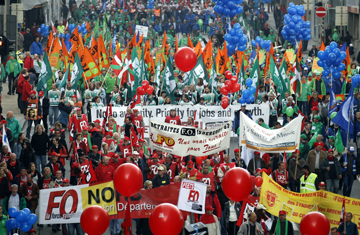
European workers and trade union representatives take part in protest to demand better job protection in Brussels
Under a gray sky that seemed perpetually on the brink of a downpour, the crowd offered a colorful counterpoint to the climate in their fluorescent greens, yellows and oranges. The unions who had organized Wednesday's show of force — claiming to be 100,000-strong — had come from all corners of Europe to protest in Brussels against the savage austerity measures that their governments have been imposing in recent months.
The demonstrators brought the city center to a standstill as they marched down the wide boulevards and past the city's European quarter. Only when they reached the European Parliament's steel-and-glass edifice did they pause, whistling harder, honking their horns longer, flinging firecrackers and setting off smoke bombs.
"We're here to tell the E.U. that we're not going to pay for the bankers' bailout. Capitalism's crisis is not our fault," said Craig Johnson, 46, from Manchester, England, as he held one end of a hand-stitched red-and-gold banner for his Rail and Maritime Transport Workers union. "I am absolutely furious. We are seeing huge cuts in public services now, but the richest are getting away scot-free."
The rest of the crowd echoed Johnson's anger. Riding a gleaming fire truck, French firefighter Patrick Hotten, 53, had been at another demonstration in Paris the previous weekend, to protest the government's plans to raise the retirement age from 60 to 62. "If we were paid better pensions, then older workers would retire sooner, and younger, more efficient workers could be hired," he said.
The unions said their Brussels demonstration was meant to send a message to E.U. leaders as they contemplate new cuts in wages, pensions and employment benefits to balance their budgets. Similar protests were held in Greece, Italy, Ireland and Latvia, where unions urged governments to guarantee workers stable jobs, strong social protection, and better pensions.
In Spain, with one out of five workers jobless, unions launched a 24-hour general strike on Wednesday, hitting transport and other public services. They marched through Madrid, protesting against a swath of labor market reforms, and skeptical about the need for austerity. "It is window-dressing, an attempt on the part of the government to make itself look good to the rest of the world. But [the reforms] come on the back of the workers," said security guard Julio Martínez, 49.
The demonstrations come at a critical time for E.U. governments. Many countries are still reeling from the economic downturn, and some —like Ireland and Portugal — could be forced to plead for emergency aid over the next few months. Earlier this year, the Greek debt drama brought the country within a whisker of default; it was only tentatively settled in May when the eurozone bailed out Athens and created a trillion-dollar war chest to prop up any other weak euro members.
The crisis emphasized how profligate spending by national governments could imperil the single currency, and the current austerity measures are an attempt get public finances under control. But E.U. leaders have also sought more permanent solutions. At the very moment the unions were filing through Brussels, the European Commission was unveiling long-awaited proposals to revamp the system through a combination of better auditing and tougher penalties for euro-zone budget rule breakers.
Under the new system, a state suffering from an excessive deficit would have to place 0.2% of its gross domestic product in a non-interest-bearing deposit, which would turn into a fine if the state fails to tackle its debt. The planned rules "will give teeth to enforcement mechanisms and limit discretion in the application of sanctions," the Commission said. European Commission President José Manuel Barroso said they would "mark a sea change in the way economic governance is dealt with in the European Union." The Commission's proposals have yet to be endorsed by E.U. governments: in the past, member states have proved reluctant to allow foreign bureaucrats to delve into their public finances.
Yet even if they could plug the budgetary gaps, the measures would do little to address what many economists describe as the biggest weakness amongst the most vulnerable euro-zone members: a severe loss of competitiveness. As unit labor costs have risen, growth has fallen and major market reforms have faltered. "Poor economic-growth prospects, rather than fiscal ill-discipline, lie at the heart of the currency union's problems," says Simon Tilford, chief economist at the Centre for European Reform, a London-based think tank. "But the E.U.'s inadequate policy response ignores this and risks condemning the eurozone to permanent crisis."
The demonstrations in Brussels and elsewhere show how tricky reforms can be. However, there has also been widespread support for the austerity measures: a recent Eurobarometer poll showed three-quarters of Europeans believe that steps to reduce public debt and deficits must be taken. And across the E.U., governments are still determined to push down the long and painful road to better public finances, as Barroso reportedly told a delegation from the European Trade Union Confederation in a closed-door meeting just hours after announcing his fiscal reform plans.
That message is unlikely to soothe the union protesters, who say
they are bearing ever-heavier burdens as Europe attempts to crawl back
to recovery. The crowd in Brussels was relatively restrained — the
hefty presence of riot police undoubtedly had an effect — but there
was an undercurrent of bottled-up fury. "We workers are losing rights but are being asked to work more," says Valter Bansa, 50, a Slovenian
metal worker in a red T-shirt emblazoned with Che Guevara's image.
"This time, we have had enough." But it's the next few months that will truly test his
breaking point.
—
With reporting by Lisa Abend / Madrid
